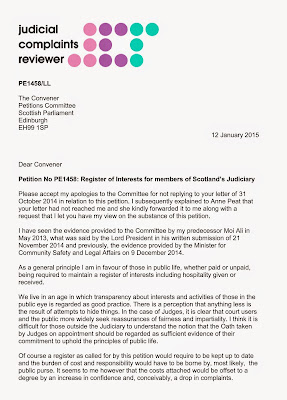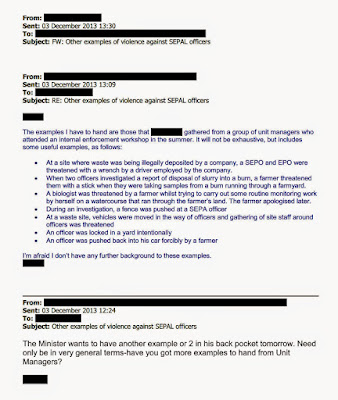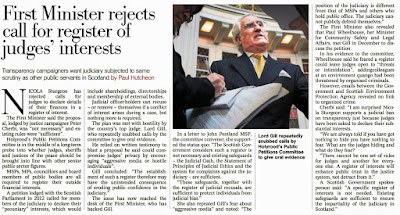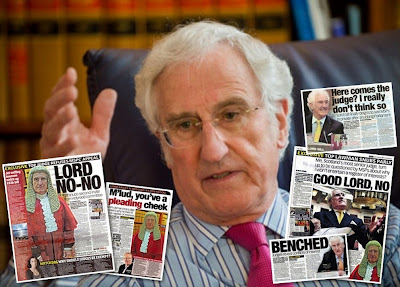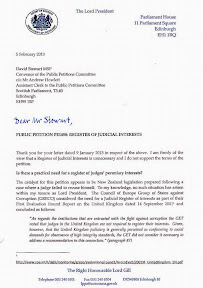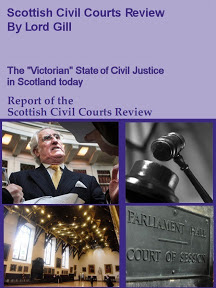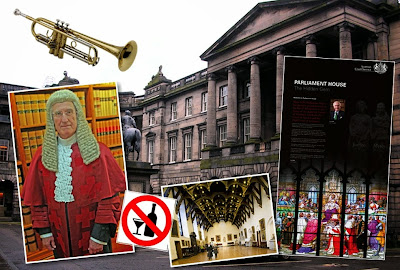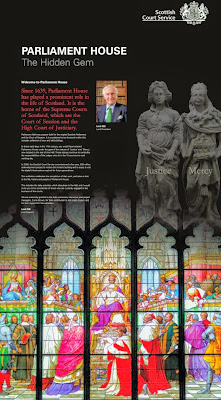 Questions of judicial integrity as former top prosecutor steps aside in case THE FORMER Lord Advocate who prosecuted two Libyans for the bombing of Pan Am flight 103 over Lockerbie, Scotland in December 1988 now features among a list of judges who have been required to step aside (recuse) in cases where conflicts of interest have come to light.
Questions of judicial integrity as former top prosecutor steps aside in case THE FORMER Lord Advocate who prosecuted two Libyans for the bombing of Pan Am flight 103 over Lockerbie, Scotland in December 1988 now features among a list of judges who have been required to step aside (recuse) in cases where conflicts of interest have come to light.
Lord Colin Boyd – who was Scotland’s top law officer from February 2000 to October 2006 and is now a Court of Session judge – recused – or- stood down from a civil case earlier this month due to the fact one of the respondents involved was convicted of offences while Lord Boyd was Lord Advocate.
The term “recusal” relates to where a judge can or should be disqualified from participation in the decision in a case, for reasons such as a conflict of interest such as a link to any party involved in a court hearing, or a financial or personal interest in the outcome of a court case.
The details – minus any actual reference to the case itself - came to light in recent additions to the ‘recusal register’ – now required to be published by the Scottish judiciary after undertakings were given by outgoing top judge Lord Gill to msps who are investigating calls for a register of judicial interests as called for in Petition PE1458: Register of Interests for members of Scotland's judiciary.
The proposals under investigation by the Scottish Parliament call for the creation of a single independently regulated register of judicial interests containing information on judges backgrounds, their personal wealth, undeclared earnings, business & family connections inside & outside of the legal profession, offshore investments, hospitality, details on recusals and other information routinely lodged in registers of interest across all walks of public life in the UK and around the world.
However - despite the fact Scotland’s judges take home a whopping £30.6 million pounds a year in judicial salaries and other perks - not one judge has revealed or declared a financial related conflict of interest.
The lack of financial related recusals has raised questions as to whether judges are telling the truth in court after details have emerged over the past two years of staggering wealth, secretive links to big business, judicial participation in offshore tax avoidance schemes and property empires – all leading back to the judiciary.
Among those in the judiciary snared on the year old list of recusals - outgoing Lord President Lord Brian Gill was forced to step aside in a case after his own son – Brian Gill junior appeared in the Court of Session representing one side in a civil case.
An example of where a failure by a judge to recuse himself from a miscarriage of justice appeal reported Mr William Beck - who was convicted of an armed robbery in 1982 and has been fighting a long battle to clear his name since, had his appeal against conviction thrown out by Lord Osborne.
Lord Osborne failed to declare in court he prosecuted him in the original cases all those years ago while working for the Crown Office.
A letter containing evidence provided by Mr William Beck to the Scottish Parliament reveals how one judge, Lord Johnston, failed to declare any interest or recuse himself from an appeal by Mr Beck against a wrongful conviction & sentence handed down by Lord Dunpark - who was Lord Johnston’s father.
Mr Beck’s submission to MSPs also revealed, Lord Osborne, who sat with two other judges and rejected another appeal by Mr Beck against his wrongful conviction, failed to disclose that he was the prosecutor in the original trial of Mr Beck.
When asked by the Sunday Mail newspaper why he did not recuse himself at the time, Lord Osborne claimed he forgot.
No action has been taken against Lord Osborne over his failure to recuse in the Beck case, and a number of other cases in Scotland’s courts are now coming under suspicion of being ruled upon by judges with vested interests in the outcomes of cases.
And, earlier this year, a sheriff was suspended by Scotland's top judge after the Scottish Sun newspaper reported details of a multi million pound writ against Glasgow law firm Levy & Mcrae in connection with the collapse of a £400 million hedge fund.
However, it emerged the suspension of Sheriff Peter Black Watson – formerly of Glasgow based law firm Levy and McRae - only came about after journalists from the Sun newspaper contacted the Lord President Lord Gill’s office and queried him about the writ – which Gill had allegedly not heard of until the media drew it to his attention.
A few days later, Lord Gill suspended Sheriff Peter Watson after concluding Watson’s offer to voluntarily step aside was “not appropriate and that suspension was necessary in order to maintain public confidence in the judiciary”.
The full statement from the Judicial Office for Scotland on Watson’s suspension announced:
Sheriff Peter Watson was suspended from the office of part-time sheriff on 16 February 2015, in terms of section 34 of the Judiciary and Courts (Scotland) Act 2008.
“On Friday 13 February the Judicial Office was made aware of the existence of a summons containing certain allegations against a number of individuals including part-time sheriff Peter Watson.
The Lord President’s Private Office immediately contacted Mr Watson and he offered not to sit as a part-time sheriff on a voluntary basis, pending the outcome of those proceedings.
Mr Watson e-mailed a copy of the summons to the Lord President’s Private Office on Saturday 14 February.
On Monday 16 February the Lord President considered the matter. Having been shown the summons, the Lord President concluded that in the circumstances a voluntary de-rostering was not appropriate and that suspension was necessary in order to maintain public confidence in the judiciary.
Mr Watson was therefore duly suspended from office on Monday 16 February 2015.”
The Scottish Sun previously reported on a dossier handed to prosecutors which focussed on Glasgow-based Mathon Ltd – which Watson was a director of - from 2007 to 2011.
Mathon was linked to the failed £400m Heather Capital hedge fund run by Gregory King.
The collapsed hedge fund Heather Capital – run by lawyer Gregory King is now the subject of a Police Scotland investigation and reports to the Crown Office. Gregory King is named along with three others – lawyer Andrew Sobolewski, accountant Andrew Millar and property expert Scott Carmichael in a police report.
The Gibraltar-based investment scheme was launched in 2004 and some of the cash was loaned by Mathon to bankroll developments across Scotland. But many of the Mathon-funded plans did not happen — and some of the cash was never repaid.
A judge in the Isle of Man has said it is likely that "fraudulent conduct exists”.
Proposals currently under investigation by the Scottish Parliament call for the creation of a single independently regulated register of judicial interests containing information on judges backgrounds, their personal wealth, undeclared earnings, business & family connections inside & outside of the legal profession, offshore investments, hospitality, details on recusals and other information routinely lodged in registers of interest across all walks of public life in the UK and around the world.
The current list of recusals published by the Judiciary of Scotland website : Judicial-Recusals - Judiciary of Scotland
 24.3.2014 Livingston Sheriff Court (Civil) Sheriff Edington:
24.3.2014 Livingston Sheriff Court (Civil) Sheriff Edington:
Sheriff drew to the parties’ attention a possible difficulty, namely the wife of one of the other resident Sheriffs was the author of a report contained with the process. The Sheriff asked parties if they wished him to recuse himself. The defenders, having considered the issue, made a motion for the Sheriff to recuse himself, which he then did.
8.4.2014 Forfar Sheriff Court (Criminal) Sheriff Veal:
Sheriff personally known to a witness
10.4.2014 Selkirk Sheriff Court (Civil) Sheriff Paterson:
Sheriff had previously acted for a client in dispute against Pursuer
23.4.2014 High Court (Criminal) Lady Wise:
Senator had previously acted for a relative of accused
16.4.2014 Glasgow Sheriff Court (Criminal) Sheriff Cathcart:
Sheriff personally known to a witness
13.5.2014 Haddington Sheriff Court (Civil) Sheriff Braid:
Known to pursuer's family
14.5.2014 High Court (Criminal Appeal) Judge MacIver:
Conflict of Interest
20.5.2014 Court of Session (Civil) Lord Matthews:
Senator personally known to a witness
19.6.2014 Dingwall Sheriff Court (Criminal) Sheriff McPartlin:
Sheriff presided over a trial involving the accused, where the issue to which the new case relates was spoken to by a witness
20.6.2014 Elgin Sheriff Court (Criminal) Sheriff Raeburn QC:
Accused appeared before Sheriff as a witness in recent trial relating to same incident
24.6.2014 Glasgow Sheriff Court (Criminal) Sheriff Crozier:
Sheriff personally known to proprietor of premises libelled in the charge
26.6.2014 Court of Session (Civil) Lord President:
Relative of Senator acts for the respondent
27.8.2014 Court of Session (Civil) Lord Brailsford:
Senator personally known to husband of the pursuer
28.8.2014 Oban Sheriff Court (Civil & Criminal) Sheriff Small:
Sheriff personally known to a party
22.10.2014 Aberdeen Sheriff Court (Criminal) Sheriff Cowan:
Sheriff drew to parties’ attention that she was a member of the RSPB before commencement of a trial as the case involved an investigation carried out by the RSPB and many witnesses were RSPB officers. She invited parties to consider whether she should take the trial. The defenders, having considered the issue, made a motion for the Sheriff to recuse herself, which she then did.
8.12.2014 Alloa Sheriff Court (Civil) Sheriff Mackie:
Contemporaneous and overlapping proceedings comprising an appeal and a referral from the children’s hearing relating to children from the same family.
16.12.2014 Court of Session (Civil) Lady Clark of Calton:
Senator personally known to parties of the action.
22.01.2015 Edinburgh Sheriff Court (Extradition) Sheriff MacIver:
Sheriff involved in case at earlier stage of procedure
30.01.2015 Dumfries Sheriff Court (Civil) Sheriff Jamieson:
Sheriff had previously dealt with the issue under dispute
06.02.2015 Greenock Sheriff Court (Civil) Sheriff Fleming:
Previous professional relationship between Sheriff's former firm of solicitors and the defender
09.02.2015 Glasgow High Court (Criminal) Lady Scott:
Due to a previous ruling made by the Senator in relation to a separate indictment against the accused
10.02.2015 Court of Session (Civil) Lord Jones:
Due to a previous finding by the Senator in relation to an expert witness whose evidence is crucial to the pursuer's case
13.03.2015 Aberdeen Sheriff Court (Criminal) Sheriff Cowan:
Accused known by the Sheriff as a regular observer of court proceedings from the public gallery
17.03.2015 Forfar Sheriff Court (Criminal) Sheriff Di Emidio:
Sheriff personally known to a witness
18.03.2015 Lerwick Sheriff Court (Criminal) Sheriff Mann:
Circumstances may give rise to a suggestion of bias
16.04.2015 Edinburgh Sheriff Court (Civil) Sheriff Arthurson QC:
Personally known to a party of the action
12.05.2015 Court of Session (Civil) Lord Boyd of Duncansby:
Senator was Lord Advocate when a successful prosecution was brought against one of the respondents
4.05.2015 Edinburgh Sheriff Court (Civil) Sheriff McColl:
Sheriff personally known to a party of the action


